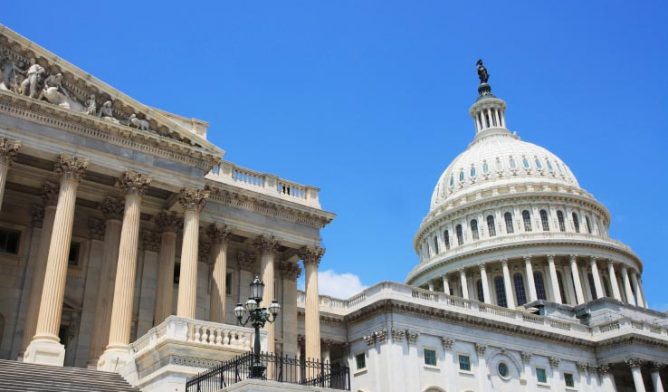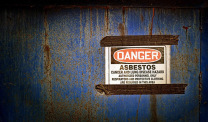Congress Fails to Vote on Asbestos Ban Legislation
Asbestos Exposure & BansWritten by Tim Povtak | Edited By Walter Pacheco

The U.S. House of Representatives last week failed to advance once-promising legislation that effectively would have banned asbestos use, frustrating advocates once again.
H.R. 1603, titled the Alan Reinstein Ban Asbestos Now Act of 2020, had been expected to pass easily under a Congressional procedure reserved for broadly supported, non-controversial legislation.
The bipartisan House Committee on Energy and Commerce had voted earlier, 47-1, to move it forward, fueling considerable optimism leading into the latest Congressional session.
If passed, the bill would have then moved to the U.S. Senate, which also had shown bipartisan support for this effort.
Instead, the bill sunk like an anchor last week. It was pulled from the agenda and never came up for a vote.
Asbestos is a toxic mineral that causes cancer, including malignant mesothelioma. It has been banned in more than 60 countries. Previous attempts to ban it in the U.S. have failed throughout the last two decades. None, though, had looked as promising as this latest attempt.
“This is devastating, just awful,” Linda Reinstein, co-founder of the Asbestos Disease Awareness Organization, told The Mesothelioma Center at Asbestos.com. “It was gut-wrenching to see what happened. I feel bad for so many people who have worked so hard for this, for asbestos victims past, present and future.”
Last-Minute Change Stalls Asbestos Ban Progress
The legislation is named for Reinstein’s husband, who died more than a decade ago from mesothelioma cancer caused by asbestos exposure.
Democratic sponsors of the bill added a last-minute provision on Sept. 25, changing what was negotiated with Republicans on the Energy and Commerce Committee and embraced by both sides.
The change was aimed at upcoming lawsuits involving possible asbestos contamination of talcum powder, a relatively new but rapidly expanding personal injury avenue.
Democrats said the change was to ensure that upcoming litigation would not be affected by the new law. Republicans believed the change was designed to create ambiguity and was another pathway to additional lawsuits.
Republicans dropped their support of the bill. Democrats then pulled the bill off the agenda.
The legislation was designed originally to amend the Toxic Substances Control Act, which regulates the use of toxic substances. It does not mention asbestos-contaminated talc.
Asbestos Legislation Is Most Comprehensive Yet
If it had passed, the legislation would have prohibited the manufacturing, processing and distribution of asbestos, or any mixture or article containing asbestos. It also would have addressed legacy asbestos, which remains a serious health risk today.
Lawmakers on both sides had compromised earlier on several issues, including a 10-year transition period for chlorine manufacturers, the only industry still using imported raw asbestos.
There also was an exception for certain national security applications.
Although asbestos already is tightly regulated, and importation of raw asbestos is at an all-time low, legislating a ban would have been a historic event.
Finger-Pointing on Both Sides Over Lack of a Vote
Each side blamed the other for the lack of a deal, frustrating advocates because of how close they were after the bipartisan Energy and Commerce Committee had made it look so promising.
“Republicans walked away from this opportunity to ban asbestos merely over language that prevents shutting the courtroom door,” Committee Chairman Frank Pallone Jr. (D-NJ) said in a statement last week in response to the last-minute change of wording in the bill.
Reps. Greg Walden (R-OR) and John Shimkus (R-IL) responded to Pallone with a statement of their own.
“Saying we walked away is simply untrue,” it read. “All Democrats have to do is drop the language added by trial lawyers and bring the bill to the floor that every one of their members voted for when it was considered by our committee. If anyone’s intentions should be questioned, we can assure you, it’s not ours.”
The House of Representatives returns to session after the November elections when it will have another chance to pass legislation, but only if the two sides can negotiate another agreement, which doesn’t look likely.
Bloomberg Law reported that the chance of Democrats returning to the originally negotiated legislation was slim.
According to a report in Politico, Republicans would agree to keep the latest provision in exchange for revisions in defining exactly what constitutes asbestos minerals.
Asbestos in Talc Becomes Dominant Issue
The issue of asbestos-contaminated talc is not going away anytime soon. Many cosmetic companies have been moving away from talc-based cosmetic products in recent years, but litigation will linger for decades.
Johnson & Johnson recently agreed to pay $100 million to settle an estimated 1,000 lawsuits involving asbestos-contaminated talc. There are almost 20,000 more lawsuits pending.
Ovarian cancer plaintiffs have been awarded more than $5 billion since the first asbestos-contaminated talc case was settled in 2013.
“While we understand and respect the legislative process, hundreds of thousands of families who have been affected by asbestos-related illnesses are waiting for action,” said Reinstein. “Our hope is that when they return in November, they can get something done. It’s long overdue.”






